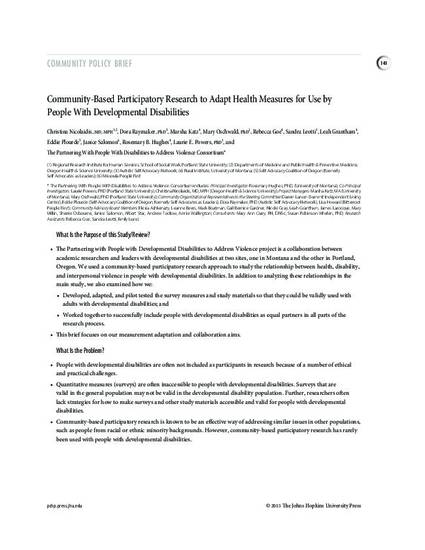
- Public health -- Research -- Citizen participation,
- People with disabilities -- Medical care -- Surveys,
- Developmental disabilities -- Quantitative research,
- Health planning,
- Adaptability (Psychology) -- Measurement
Background: People with developmental disabilities (DD) are often not included as participants in research owing to a variety of ethical and practical challenges. One major challenge is that traditional measurement instruments may not be accessible to people with DD. Participatory research approaches promise to increase the participation of marginalized communities in research, but few partnerships have successfully used such approaches to conduct quantitative studies people with DD.
Objective: To use a community-based participatory research (CBPR) approach to create an accessible, computer-assisted survey about violence and health in people with DD, and to psychometrically test adapted health instruments.
Methods: Our academic–community partnership, composed of academic researchers, people with DD, and supporters, collaboratively selected and modified data collection instruments, conducted cognitive interviews and pilot tests, and then administered the full survey to 350 people with DD.
Results: Although team members sometimes had opposing accommodation needs and adaptation recommendations, academic and community partners were able to work together successfully to adapt instruments to be accessible to participants with a wide range of DD. Results suggest the adapted health instruments had strong content validity and all but one had good to excellent internal consistency reliability (alpha, 0.81–0.94). The majority of participants (75%) responded that all or most of the questions were easy to understand.
Conclusions: Researchers should consider using participatory approaches to adapting instruments so people with DD can be validly included in research.

Originally appeared in Progress in Community Health Partnerships: Research, Education, and Action, Volume 9, Issue 2, published by Johns Hopkins University Press. Can be found at https://www.press.jhu.edu/journals/progress_in_community_health_partnerships/
© 2015 The Johns Hopkins University Press